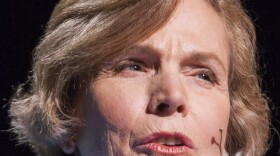
Christina Cala
Christina Cala is a producer for Code Switch. Before that, she was at the TED Radio Hour where she piloted two new episode formats — the curator chat and the long interview. She's also reported on a movement to preserve African American cultural sites in Birmingham and followed youth climate activists in New York City.
Before that, she spent five years producing, reporting and editing for NPR's evening news program, All Things Considered. While at All Things Considered, she reported from the Colombia-Venezuela border on the migration crisis, covered immigration from both sides of the U.S.-Mexico border, told the story of one man moving through the immigration system, field-produced from the Trump-Putin summit in Helsinki and reported her first piece from Puerto Rico after Hurricane Maria. Her reporting on the border was part of a 2019 Edward R. Murrow award-winning package.
In her role with All Things Considered, Cala served as the show's update producer and director, participating in special breaking news coverage. She also led music coverage for the show, reporting and producing from SXSW, editing music reviews and training the next generation of music critics.
In 2018, she co-founded the MGIPOC (Marginalized Gender and Intersex People of Color) Mentorship Program at NPR. The program includes one-on-one mentorship, scholarships for conferences, monthly brown-bags and an annual speaker symposium. She and her co-founders have presented on the program at ONA, Third Coast, Werk It and more. She and her co-founders received the NPR Diversity Success employee award for their work in 2018.
Before coming to NPR, she reported internationally from Lima on the Carnegie Foundation Global Reporting Fellowship, Munich on the Eric Lund Global Reporting and Research grant, and at the Times/Sunday Times Newspaper in Cape Town.
She graduated from Northwestern University with her Bachelor's of Science and Master's of Science in Journalism.
-
From our summer round-up of Books We Love, NPR staffers give recommendations for books they literally loved - all about romance.
-
Several members of NPR's staff recommend fiction from this year's Books We Love list: "The Mighty Red," "Catalina," "Help Wanted," "Piglet" and "Mina's Matchbox."
-
NPR staff recommend 6 new novels for summer reading: "How to End a Love Story," "Victim," "The Women," "A Short Walk Through a Wide World," "Birding with Benefits" and "Swift River."
-
NPR staffers recommend five of this year's new novels for summer reading: "The Ministry of Time," "The Familiar," "Come and Get It," "Memory Place," and "Sex, Lies and Sensibility."
-
Xiye Bastida was raised in the highlands of Mexico with an understanding that she had to thank the Earth for everything it provided. Now, she's dedicated her entire life to the issue of protecting it.
-
Computer scientist Joy Buolamwini is on a mission to fight bias in algorithms. In this comic, Buolamwini discusses the way biased algorithms can lead to real world inequality — and what we can do.
-
Legendary oceanographer Sylvia Earle has been exploring and working to protect our oceans for more than half a century. Her message has stayed the same: we're taking our oceans for granted.
-
What does it mean to be healthy and to care for our bodies? This hour, physician and writer Jen Gunter empowers us to cut through false medical claims and make informed decisions about our health.
-
Monarch butterflies fly the longest two-way migration of any insect species. Ecologist Sonia Altizer shares how these intrepid butterflies make the journey — and how it's being threatened.
-
Science fiction author Charlie Jane Anders explains how the genre is a portal for us to imagine different ways of being human. She invites listeners into one new world with an excerpt from her work.




